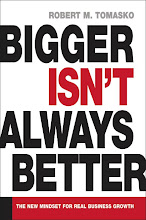February 10, 2006
Is a bigger executive paycheck a better one ? (part 2)
This week New Yorker columnist James Surowiecki joins the chorus of concern about bigness (see Feb 7 post) in executive compensation. He cites a study by professors Gerald Garvey and Todd Milbourn:
Overpaid CEOs may be more than just expensive, says Surowiecki. They are often downright destructive:
Another study, this one by finance professors Jarrad Hartford and Kai Li, concludes:
There are many populist arguments for reining-in executive pay, and relating it to performance, not position. There are also strong ones based on management theory – paying the top people hundreds of times more than those in the rest of the organization isolates them and destroys corporate cohesiveness. But some of the most compelling are those that show how bloated pay also makes poor economic sense.
Link
“Executives are rewarded far more for good luck in their industry (like rising oil prices that they had no control over) than they are punished for bad luck.”
Overpaid CEOs may be more than just expensive, says Surowiecki. They are often downright destructive:
“One recent study of the market between 1992 and 2001 by economists at Rutgers and Penn State found that the more a CEO was paid, relative to his peers, the more likely his company was to underperform in the stock market.”
Another study, this one by finance professors Jarrad Hartford and Kai Li, concludes:
“Very highly paid executives are more likely than their peers to make acquisitions, and to receive major financial rewards for doing so, even when the acquisition ends up destroying corporate value.”
There are many populist arguments for reining-in executive pay, and relating it to performance, not position. There are also strong ones based on management theory – paying the top people hundreds of times more than those in the rest of the organization isolates them and destroys corporate cohesiveness. But some of the most compelling are those that show how bloated pay also makes poor economic sense.
Link
